 Petzlover
Petzlover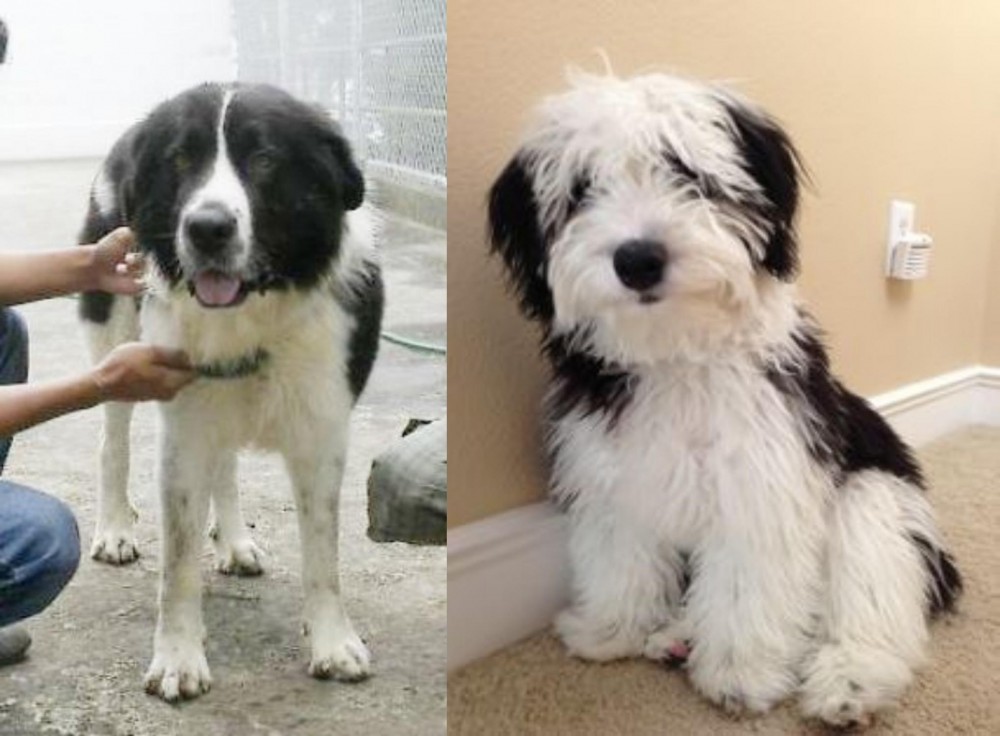 Mucuchies is originated from Venezuela but Mini Sheepadoodles is originated from United States. Mucuchies may grow 19 cm / 8 inches higher than Mini Sheepadoodles. Mucuchies may weigh 41 kg / 91 pounds more than Mini Sheepadoodles. Mucuchies may live 3 years less than Mini Sheepadoodles. Both Mucuchies and Mini Sheepadoodles has almost same litter size. Mucuchies requires Low Maintenance. But Mini Sheepadoodles requires Moderate Maintenance
Mucuchies is originated from Venezuela but Mini Sheepadoodles is originated from United States. Mucuchies may grow 19 cm / 8 inches higher than Mini Sheepadoodles. Mucuchies may weigh 41 kg / 91 pounds more than Mini Sheepadoodles. Mucuchies may live 3 years less than Mini Sheepadoodles. Both Mucuchies and Mini Sheepadoodles has almost same litter size. Mucuchies requires Low Maintenance. But Mini Sheepadoodles requires Moderate Maintenance
 The Mucuchies are a breed born in the Venezuelan mountains, in the late 1700s. They are rare today but were popular in the mountains for hundreds of years. They are believed to be a cross between the dogs brought by the Spanish Conquistadors in the 14th and 15th centuries and the local dogs. However, by the 1960s this rare breed was close to extinction.
The Mucuchies are a breed born in the Venezuelan mountains, in the late 1700s. They are rare today but were popular in the mountains for hundreds of years. They are believed to be a cross between the dogs brought by the Spanish Conquistadors in the 14th and 15th centuries and the local dogs. However, by the 1960s this rare breed was close to extinction.
Bred primarily as herders and watchdogs, their ancestry likely included the Algerian Mastiff, the Spanish Mastiff, the Great Pyrenees, and the Atlas Shepherd, otherwise known as the Aidi. The early development of the Mucuchies is attributed to Wilender Ferrari, DVM. At the time, Simon Boliva was fighting for Venezuelan independence in the city of Mucuchies. He adopted a member of the breed and named it for the city. The name stuck as the name for the breed.
Later in this timeframe, the Mucuchies was crossbred with the Pyrenean Mastiffs that friars brought to the Andes from their monasteries. With them, they also brought the sheep for the dogs to herd and guard. During the 1920s the breed spread throughout the country, but by the beginning of the 1960s there was a major decline in the breed. This was partly due to changes in culture and lifestyle in the Andes.
In 1961 a Mucuchies club was formed for the breed preservation and the breed was formally named the National Dog of Venezuela. The club was disbanded in the mid-1960’s and this led the breed to the edge of extinction. By 2008 there was another major push to save the breed. This effort came from the government who wanted to preserve the breed. In 2008, they created the Fundacion Nevado and sent six Mucuchies to the Waraira Repano Cable Car System in the El Avila National Park so that the dogs would be in a climatic environment as similar to the Andes mountain as possible. This was successful and the program was increased by Venezuelan President Hugo Chavez.
As the breed continued to develop the shepherding instincts were lost and the guarding aspects were strengthened. This left today’s Mucuchies as a breed of gentle, active dogs with strong characters and a loving disposition. They are gentle with their families but protective and aggressive with strangers. They are the only native breed of Venezuela and currently, there are programs in the mountains to re-establish and strengthen them.
In addition to their name for the town of Mucuchie, the breed is also called the Paramo’s Dog or the Snowy. These programs exist because in Venezuela they are near extinction once again. This is the result of inbreeding and more cross-breeding, this time with larger dogs like St. Bernards. Thus, the continued efforts by the Nevado Foundation with the assistance of the government to restore the original Mucuchies breed to Venezuela.
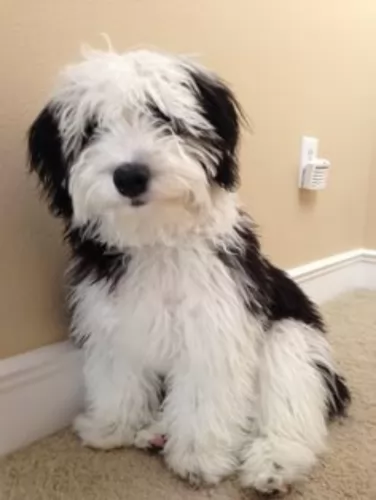 The Mini Sheepadoodle is such a sweet, teddy bear of a dog. It comes from two awesome dog breeds – the Old English Sheepdog and the Miniature Poodle. It is thought that the dog originated in the USA.
The Mini Sheepadoodle is such a sweet, teddy bear of a dog. It comes from two awesome dog breeds – the Old English Sheepdog and the Miniature Poodle. It is thought that the dog originated in the USA.
They are two very different looking dogs, but their personalities are fairly similar. This designer dog isn’t purebred and isn’t registered with the American Kennel Club (AKC).
 The appearance of the Mucuchies is that of a breed of large dogs who stand two feet at the shoulder and can weight one hundred pounds. They have a deep chest, heads that are wedge-shaped and skulls shaped like domes. Their muzzles are straight, and their nostrils are large on their black nose. The Mucuchies have dark eye and eyelids along with ears that are triangular in shape and medium in size. Their lips are black but this and he has a well-developed ruff.
The appearance of the Mucuchies is that of a breed of large dogs who stand two feet at the shoulder and can weight one hundred pounds. They have a deep chest, heads that are wedge-shaped and skulls shaped like domes. Their muzzles are straight, and their nostrils are large on their black nose. The Mucuchies have dark eye and eyelids along with ears that are triangular in shape and medium in size. Their lips are black but this and he has a well-developed ruff.
They are large, sturdy dogs with a grand appearance and tremendous energy. Their neck is strong, short and very muscular with wide shoulders and a straight back. The tail is much longer than their hocks and it is shaped like a fan and he raises it when he is alerted. They have a short, thick coat and most are white or white with gray, honey or black. This is a very attractive breed.
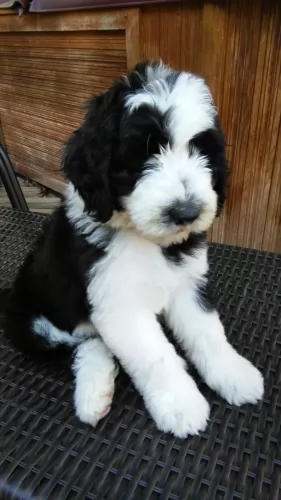 The Mini Sheepadoodle, a mix between the Mini Poodle and Sheepdog stands at between 48 and 52cm and weighs between 11 to 20kg.
The Mini Sheepadoodle, a mix between the Mini Poodle and Sheepdog stands at between 48 and 52cm and weighs between 11 to 20kg.
He is solidly built with a broad skull and face. The coat is usually medium length and can be either straight, wavy or curly. The coat can be quite a few colors depending on the parents. Some are brown, cream or black while others are white and grey or white and brown.
He is a low shedding dog. He has a double coat which will still need brushing. This hybrid breed has a thick coat that will need to be trimmed professionally every now and then as well. This is good for hot weather and for reducing the time it takes to groom the pet.
They’re easy-going, social dogs, loving to spend time with their human families. They are gentle and patient with children and they get on well with other pets in the home as well.
The Poodle is a very intelligent dog and because there is Poodle in the Mini Sheepadoodle, you can be sure that your dog is going to be bright too and that he will be able to be trained and socialized with ease. They’re friendly and don’t do too well as watchdogs.
 Good with children and very good with their own families. Might be a little standoffish with others.
Good with children and very good with their own families. Might be a little standoffish with others.
They no longer have the strong herding instinct but are outstanding guard dogs.
Yes but need land to run in. Don’t put this giant dog in an apartment. You will both be miserable.
Very intelligent and their ability and willingness to learn is very good.
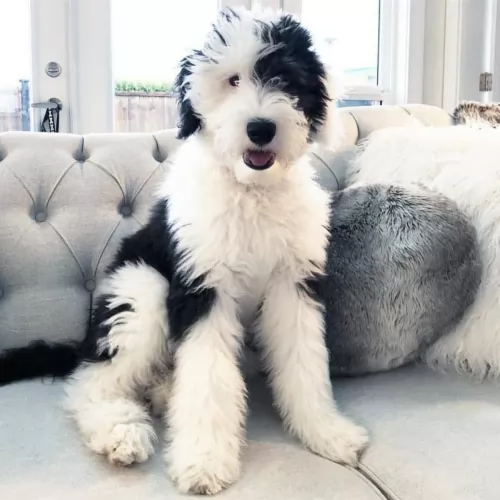 The Mini Sheepadoodle is such an affectionate teddy-bear dog and is calm, gentle and loving.
The Mini Sheepadoodle is such an affectionate teddy-bear dog and is calm, gentle and loving.
They make perfect family pets and want to please their owners. He is friendly and gets on well with his human family as well as with other pets in the home.
Children love him as he is always willing to have a game. They’re sociable and playful and make a wonderful canine pet and companion in your home.
 Because of their rarity and somewhat isolation, they do not have many genetic health concerns. They do however face at least a couple of the issues that most large dogs face.
Because of their rarity and somewhat isolation, they do not have many genetic health concerns. They do however face at least a couple of the issues that most large dogs face.
This can be a serious issue for such a large dog. It can cause arthritis and lameness.
This might be the biggest threat to the Mucuchies’ health. They are big dogs and if they injury limbs it can be quite serious.
The distension or inversion of the stomach and intestines is potentially fatal and must be treated immediately. Large dogs are prone to bloat and feeding schedules can go a long way in preventing it.
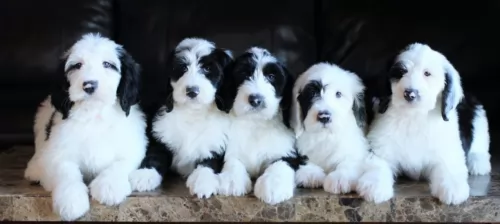 They’re healthy dogs and you’re not likely to be spending too much time at the vet. Every dog can be prone to any one of the many common dog illnesses there are. These can be hip dysplasia, obesity, bloat, dental disease, cataracts and more.
They’re healthy dogs and you’re not likely to be spending too much time at the vet. Every dog can be prone to any one of the many common dog illnesses there are. These can be hip dysplasia, obesity, bloat, dental disease, cataracts and more.
This can be a life-threatening disease and treatment will be required as soon as possible. Known also as gastric dilatation and volvulus, the stomach twists and fills with gas. The dog’s stomach becomes distended with gas, and pressure is placed on the diaphragm, creating breathing problems.
Your dog will have a swollen stomach, he’ll be drooling and panting and he’ll be restless and he may even make little whimpering noises because he is in pain. He may be trying to vomit. Your dog needs to get to the vet immediately.
This is a leading health concern with many dogs and with the Mini Sheepadoodle as well. It’s a condition where there is an abnormal formation of the hip socket. It can lead to pain and arthritis and you may even notice your once-active pet battling to do what he once did, even when he is still young.
There are things that can be done though and your vet will discuss treatment methods with you and ideas to make it comfortable for your pet.
 As mentioned in health concerns, feeding appropriately is critical to the Mucuchies’ health. Puppies need a high quality, large breed dry food 2-3 times per day at ½ cup each time. Don’t overfeed. Don’t exercise before or after eating to prevent bloat.
As mentioned in health concerns, feeding appropriately is critical to the Mucuchies’ health. Puppies need a high quality, large breed dry food 2-3 times per day at ½ cup each time. Don’t overfeed. Don’t exercise before or after eating to prevent bloat.
The adult Mucuchies should eat at least twice a day for a total of two and one-half cups. So, you might feed one and ¼ cup at each meal. Again, it is critically important that you don’t overfeed. Don’t feed before or after strenuous exercise and don’t let your Mucuchies eat too quickly in order to avoid bloat.
This is a large dog with generally very good health. His stamina and heart will impress you.
The Mucuchies is not an active inside dog, but he is a large dog that needs daily exercise. They need to be able to run or at least to trot. A large yard or dog bark is necessary. However, this big, double coated dog hates the hot weather and needs a cooler climate. Winter is fine with him. Don’t overwork them while they are growing. Walks are the best exercise for this breed.
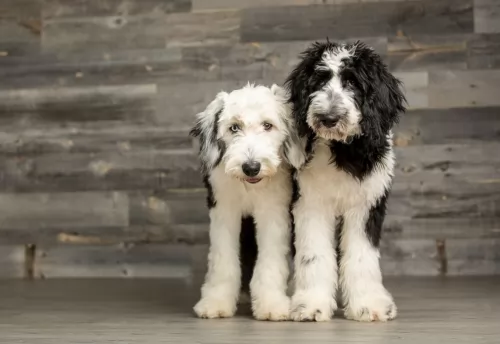 The Mini Sheepadoodles will need quite a lot of exercise as he is an active dog. Walks are always a super idea, and hikes even better. He will love other forms of activities such as ball games, hide and seek, ropes games and general rough and tumble games.
The Mini Sheepadoodles will need quite a lot of exercise as he is an active dog. Walks are always a super idea, and hikes even better. He will love other forms of activities such as ball games, hide and seek, ropes games and general rough and tumble games.
A brush every other day will be required. You can have your pet professionally trimmed. Check him over during brushing for unusual lumps. Check inside his ears and inside his mouth as he can’t tell you about ear infections or a bad tooth causing him a lot of pain.
Provide your wonderful dog with the best food there is. Just like human beings, food plays an important role in good health. Learn to read the labels on commercially manufactured dog foods and try to feed your pet natural, wholesome foods with vitamins and minerals.
Some of the more inferior brands pump their foods full of colorants and preservatives. Try and provide your Mini Sheepadoodle with some home-made food which is simple and free of spices. Things like boiled chicken, brown rice and vegetables chopped up and added to the dry kibble sometimes can do your pet a lot of good.
Make sure his vaccines are up to date and make sure you have a reliable trusted vet to turn to when he is sick.